Robert Emmet is one of Ireland’s most romantic and best remembered nationalist leaders. He might have easily been forgotten but he earned lasting fame because of three aspects of his passionate nature.
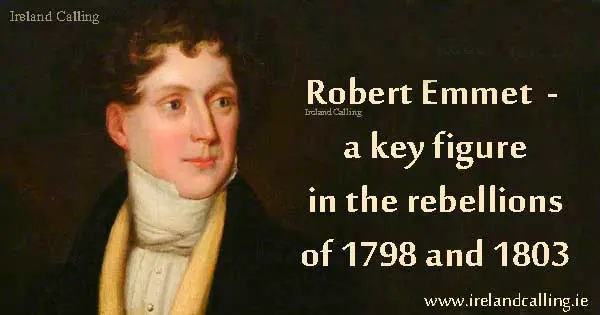
First, there was his passion for his country which caused him to risk his life in a rebellion that had no chance of success. Secondly, there was his passion for his lover that caused him to risk his life by moving from a safe house to a more dangerous one just to be near her a time when the British authorities wanted to capture and execute him. Thirdly, there was his passionate speech from the dock during his trial which still resonates with nationalists more than 200 years after he was executed.
Emmet was a political idealist rather than a practical revolutionary.
He was born in 1778 into a prosperous protestant family in Dublin. He went to Trinity College when he was only 15 and quickly got involved in Irish politics and started associating with leading nationalists.
He became the secretary of the United Irish Committee which led to him being expelled from Trinity in April 1798.
Emmet sought help for Ireland from Napoleon
He took part in the 1798 Rebellion by going to France to lobby Napoleon to provide support in the form of arms and soldiers. The French leader promised help but it never materialised.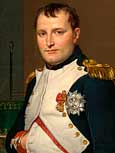 Emmet continued to seek support from the French and by 1802 he was ready to start another uprising to gain Irish independence. He organised secret safe houses for the manufacture of arms and explosives.
Emmet continued to seek support from the French and by 1802 he was ready to start another uprising to gain Irish independence. He organised secret safe houses for the manufacture of arms and explosives.
The plan was to create a large arsenal while building up support from rebels across Ireland with a view to beginning a rebellion towards the end of 1803. However, an accidental explosion at one of the arms depots alerted the British authorities, forcing Emmet to bring forward his plans.
The rising began on 23 July as the rebels attempted to take Dublin Castle. Unfortunately for Emmet, less than a hundred rebels turned up out of the thousands expected and the rebellion turned into little more than a disorganised riot.
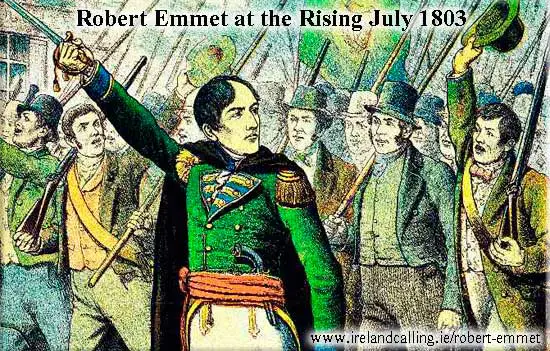 Emmet witnessed a dragoon being brutally killed with a pike and so he called off the rebellion to avoid further bloodshed in a cause which he realised could not succeed given the number of rebels involved.
Emmet witnessed a dragoon being brutally killed with a pike and so he called off the rebellion to avoid further bloodshed in a cause which he realised could not succeed given the number of rebels involved.
The British authorities quickly dispersed the rebels, but not before they had dragged the Lord Chief Justice of Ireland, Lord Kilwarden, from his carriage and attacked him with pikes. He died shortly afterwards.
Emmet was horrified. Kilwarden had been a liberal judge and had used his influence to help save the life of another Irish nationalist leader, Wolfe Tone, back in 1794.
As the rebellion quickly disintegrated, Emmet was forced to go into hiding to save his life. He knew he would be executed if he was caught.
At first he stayed at a safe house at Rathfarnham and the British were unable to find him.
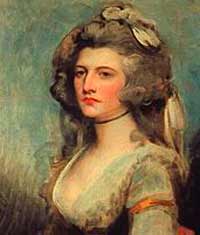 However, he then moved to a more exposed location at Harold’s Cross because he wanted to be near his lover, Sarah Curran. He was captured shortly afterwards on 25 August and tried for treason on 19 September.
However, he then moved to a more exposed location at Harold’s Cross because he wanted to be near his lover, Sarah Curran. He was captured shortly afterwards on 25 August and tried for treason on 19 September.
As the leader of a rebellion, Emmet had little chance of avoiding execution but the British government decided to make certain by bribing his defence lawyer, Leonard McNally, with an offer of £200 and a state pension.
Predictably, Emmet was found guilty of treason and sentenced to be hanged, drawn and quartered.
He then made a speech which ensured his fame forever in nationalist circles and has since become known as the Speech from the Dock.
In the brief speech he insists that no one should write his epitaph until Ireland is free and takes its place among the nations of the world.
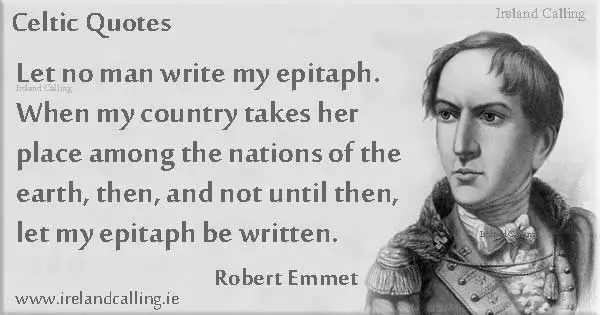
Robert Emmet’s Speech from the Dock
Let no man write my epitaph; for as no man who knows my motives dare now vindicate them, let not prejudice or ignorance, asperse them. Let them and me rest in obscurity and peace, and my tomb remain uninscribed, and my memory in oblivion, until other times and other men can do justice to my character. When my country takes her place among the nations of the earth, then and not till then, let my epitaph be written. I have done.
The final lines in particular, are among most famous quotes from Irish nationalist history and have ensured that Emmet is remembered despite the failure of his rebellion.
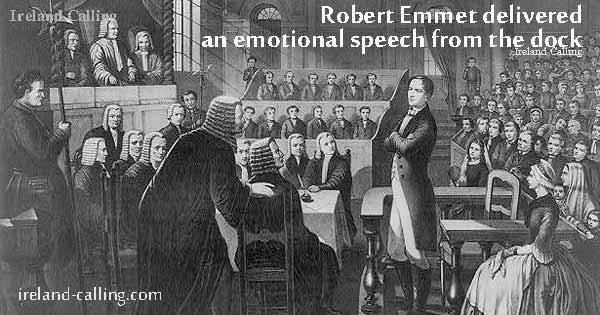
Read Robert Emmet’s full ‘Speech from the Dock’ and watch a video of the speech here.
history.html